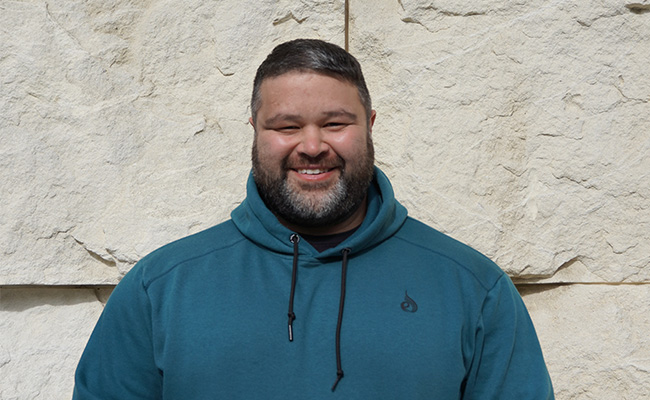
Brent Paehua's summer scholarship project changed his perspectives on alternative meats.
Brent Paehua reckons that if his dad, “a Māori guy born in the '50s”, can accidently buy alternative meat burgers and enjoy them, that shows how far research and development into alternative proteins has come.
After working in social services - with both the Accident Compensation Corporation and Oranga Tamariki - Brent began to be interested in the way that social interactions and race intersected.
He is now in his third year of a Bachelor of Arts at Otago, majoring in Sociology with a minor in Criminology.
As part of the Summer Scholarship programme Brent spent his summer working from the Centre for Sustainability, supervised by Dr Simon Barber, and contributing towards ongoing research on Protein Futures: Future Scenarios for Land-Use in Aotearoa New Zealand.
The ongoing research is being undertaken by The Agribusiness group, Ruralis-Norway, The University of Otago, and the University of Canturbury and is funded by Our Land and Water national Science Challenge.
His part of the project focused on examining the potential linking factors between Te Ao Māori and emergent alternative proteins.
At first he thought the project might be too “sciency” for his interests, but once he started thinking about the social factors, and how they interact with the science, he was on board.
“There were a lot of different elements to the project, and I learnt a huge amount from the minutiae of alternative and emerging proteins to the cultural, social and economic factors which surround their consumption.”
The work changed his perspective.
“I went from Joe Public with a pretty stereotypical view of alternative food products (plant based, alternative proteins), to someone who now struggles to avoid having difficult conversations about the climate impacts of the meat and dairy industries with my friends and whānau.”
Brent is not vegan though, and says he does not think there has to be an “all or nothing” approach to diet.
He eats alternative protein alongside meat now, and avoids dairy, explaining that “moving away from what you're taught a healthy diet looks like- meat and three vege- is a big part of rethinking protein consumption”.
Engaging Te Ao Maori in alternative proteins has- until now- had a focus of the concept of kaitiakitanga.
Kaitiakitanga is the ethic or practice of protection and conservation of Aotearoa and our environment.
“Engaging Māori in alternative proteins requires much more than the suggestion of kaitiakitanga, it requires education, collaboration and an appreciation for Mātauranga Māori.”
Brent's summer research suggests that engaging Te Ao Māori in alternative meat discourses should be more holistic in approach, combining different factors to explain why these new proteins could be beneficial.
About 68,000 Māori are food insecure at the moment in Aotearoa, and alternative meat investment, development and consumption could be a solution to that, he says.
“While Māori are invested in agriculture, the model of farming that we have today was introduced during colonisation. The way that we farm, and the way that we eat, doesn't reflect traditional Māori practises pre-colonisation.
“If Te Ao Māori shift that investment to alternative meats, there could be huge social and economic benefits. It would give us the opportunity to be world leaders in an emerging field.”
Brent says by using an alternative meat model, the whole world's protein needs could be fulfilled using an area of land the size of greater London, which shows how effective a transition could be in terms of ending food insecurity.
One thing that Māori might be concerned about when thinking about alternative proteins, says Brent, is the way food and culture are entwined in Te Ao Māori.
“Food is integral to a lot of Māori cultural practices, but that wouldn't have to change. Things like hāngī and hunting and gathering don't have the huge environmental impact we know for sure our agriculture industry does.”
“We don't need to look at changing those cultural practices necessarily, we need to look at changing daily protein consumption. Although over the summer we did have a lot of tongue in cheek talks about how alternative meat would perform in hāngī or boil up.”
One “amazing” thing that came out of the project was the conversations he was able to have with his dad about his research.
“My dad grew up in the Kaitupeka Valley in Taumaranui, in a totally Māori community with no power and no running water, and I've got to admit at first, he was pretty sceptical of the idea of meat alternatives.
“By the end of the project though, he really started to get on board. Maybe not with the changing of meat and three vege traditions so much - that might be a step too far - but with the social and environmental factors.
“He actually bought some vegan burger patties by accident one day while I was doing the project. He called me up and said, 'you'll never guess what I bought'.”
His dad's review was that, “With enough sauce, you can't notice much of a difference”.
Getting to have those long discussions with his dad allowed him to get to know his dad even better, which was a really special part of the project, says Brent.
Kōrero by Internal Communications Advisor Alice Billington
